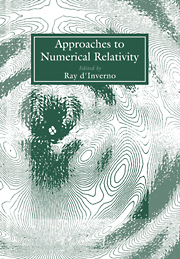Book contents
- Frontmatter
- Contents
- Contributors
- Introduction
- Preface
- PART A THEORETICAL APPROACHES
- PART B PRACTICAL APPROACHES
- Numerical asymptotics
- Instabilities in rapidly rotating polytropes
- Gravitational radiation from coalescing binary neutron stars
- “Critical” behaviour in massless scalar field collapse
- Godunov-type methods applied to general relativistic stellar collapse
- Astrophysical sources of gravitational waves and neutrinos
- Gravitational radiation from 3D gravitational stellar core collapse
- A vacuum fully relativistic 3D numerical code
- Solution of elliptic equations in numerical relativity using multiquadrics
- Self-gravitating thin discs around rotating black holes
- An ADI scheme for a black hole problem
- Time-symmetric ADI and causal reconnection
- The numerical study of topological defects
- Computations of bubble growth during the cosmological quark-hadron transition
- Initial data of axisymmetric gravitational waves with a cosmological constant
- PANEL DISCUSSION
Numerical asymptotics
Published online by Cambridge University Press: 15 December 2009
- Frontmatter
- Contents
- Contributors
- Introduction
- Preface
- PART A THEORETICAL APPROACHES
- PART B PRACTICAL APPROACHES
- Numerical asymptotics
- Instabilities in rapidly rotating polytropes
- Gravitational radiation from coalescing binary neutron stars
- “Critical” behaviour in massless scalar field collapse
- Godunov-type methods applied to general relativistic stellar collapse
- Astrophysical sources of gravitational waves and neutrinos
- Gravitational radiation from 3D gravitational stellar core collapse
- A vacuum fully relativistic 3D numerical code
- Solution of elliptic equations in numerical relativity using multiquadrics
- Self-gravitating thin discs around rotating black holes
- An ADI scheme for a black hole problem
- Time-symmetric ADI and causal reconnection
- The numerical study of topological defects
- Computations of bubble growth during the cosmological quark-hadron transition
- Initial data of axisymmetric gravitational waves with a cosmological constant
- PANEL DISCUSSION
Summary
Abstract. We review the present status of the null cone approach to numerical evolution being developed by the Pittsburgh group. We describe the simplicity of the underlying algorithm as it applies to the global description of general relativistic spacetimes. We also demonstrate its effectiveness in revealing asymptotic physical properties of black hole formation in the gravitational collapse of a scalar field.
INTRODUCTION
We report here on a powerful new approach for relating gravitational radiation to its matter sources based upon the null cone initial value problem (NCIVP), which has been developed at the University of Pittsburgh. We are grateful to the many graduate students and colleagues who have made important contributions: Joel Welling (Pittsburgh Supercomputing Center), Richard Isaacson (National Science Foundation), Paul Reilly, William Fette (Pennsylvania State University at McKeesport) and Philipos Papadopoulous.
As will be detailed, the NCIVP has several major advantages for numerical implementation, (i) There are no constraint equations. This eliminates need for the time consuming iterative methods needed to solve the elliptic constraint equations of the canonical formalism, (ii) No second time derivatives appear so that the number of basic variables is half the number for the Cauchy problem. In fact, the evolution equations reduce to one complex equation for one complex variable. The remaining metric variables (2 real and 1 complex) are obtained by a simple radial integration along the characteristics.
Information
- Type
- Chapter
- Information
- Approaches to Numerical Relativity , pp. 143 - 162Publisher: Cambridge University PressPrint publication year: 1992
